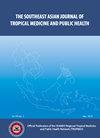尼日利亚阿南布拉州Umunze HIV患者甲状腺功能评估
IF 0.1
4区 医学
Q4 INFECTIOUS DISEASES
Southeast Asian Journal of Tropical Medicine and Public Health
Pub Date : 2023-09-16
DOI:10.9734/ajmah/2023/v21i11916
引用次数: 0
摘要
背景:在人类免疫缺陷病毒(HIV)感染者中,甲状腺功能异常在不同阶段被检测到,而高效抗逆转录病毒治疗(HAART)的效果尚不清楚。然而,对尼日利亚艾滋病毒感染者的研究不足。目的:本研究旨在测定尼日利亚阿南布拉州Umunze地区HIV阳性和HIV阴性人群的甲状腺激素水平。 材料和方法:这项横断面研究在尼日利亚Umunze无玷心脏医院的USAID/FHI诊所进行了为期6个月的95名艾滋病毒阳性和30名艾滋病毒阴性个体。根据HAART治疗方法将受试者分为HAART治疗组[48]- 1组、HAART naïve[47] - 2组和对照组[30]- 3组。对受试者进行访谈、检查并采血,测定甲状腺功能参数,包括促甲状腺激素(TSH)、游离三碘甲状腺原氨酸(fT3)、三碘甲状腺原氨酸(T3)、游离甲状腺素(fT4)和甲状腺素(T4)。结果:125名受试者中,女性占67.2%,男性占32.8%。1组受试者TSH和fT3的平均水平高于2组和3组受试者。2组患者T4平均水平明显高于1组和3组。与HAART和非HAART受试者相比,对照组T3水平均显著降低。原发性甲状腺功能减退是HIV阳性患者中最常见的甲状腺功能障碍模式,其次是孤立的低fT4。结论:本研究显示的血清甲状腺激素水平可以作为抗逆转录病毒治疗期间的基线周期性标志物,而艾滋病毒感染者可能会从适当的补充中受益。还需要进行更大规模的研究,以确定在患有甲状腺自身免疫的HIV感染者中进展为显性甲状腺疾病的危险因素。本文章由计算机程序翻译,如有差异,请以英文原文为准。
Evaluation of Thyroid Function of HIV Patients in Umunze, Anambra State, Nigeria
Background: Abnormal thyroid function tests have been detected at various phases in people living with Human immunodeficiency virus (HIV) and the effect of highly active antiretroviral therapy (HAART) not well understood. However, there is insufficient study among Nigerians living with HIV.
Objective: This study is aimed to determine thyroid hormones in HIV positive individuals compared with HIV negative individuals in Umunze, Anambra State, Nigeria.
Materials and Methods: This cross-sectional study was carried out over a period of six months among 95 HIV positive and 30 HIV negative individuals attending USAID/FHI clinic of Immaculate Heart Hospital in Umunze, Nigeria. The subjects were divided into three groups on the basis of HAART (those on HAART [48] – GROUP 1, HAART naïve [47] – GROUP 2 and Control [30] – GROUP 3). The subjects were interviewed, examined and blood sample collected for determination of thyroid function parameters which include thyroid stimulating hormone (TSH), free triiodothyronine (fT3), triiodothyronine (T3), free thyroxine (fT4), and thyroxine (T4).
Results: Among the 125 subjects recruited for the study 67.2% were females and 32.8% males. The mean levels of TSH and fT3 was found to be higher in group 1 subjects than in group 2 and the group 3 subjects. The mean level of T4 was significantly higher in group 2 subjects than group 1 and the group 3 subjects. The level of T3 was significantly lower in control subjects in comparison to both HAART and non-HAART subjects. Primary hypothyroidism is the commonest pattern of thyroid dysfunction among the HIV positive patients followed by isolated low fT4.
Conclusion: Serum levels of thyroid hormones as shown in this study may be used as baseline periodic markers during antiretroviral therapy while people living with HIV may benefit from supplementation if appropriate. There is also need for a larger study to identify the risk factors for progression to overt thyroid disease in HIV infected subjects with thyroid autoimmunity.
求助全文
通过发布文献求助,成功后即可免费获取论文全文。
去求助
来源期刊

Southeast Asian Journal of Tropical Medicine and Public Health
PUBLIC, ENVIRONMENTAL & OCCUPATIONAL HEALTH-INFECTIOUS DISEASES
CiteScore
0.40
自引率
0.00%
发文量
0
审稿时长
3-8 weeks
期刊介绍:
The SEAMEO* Regional Tropical Medicine and Public Health Project was established in 1967 to help improve the health and standard of living of the peoples of Southeast Asia by pooling manpower resources of the participating SEAMEO member countries in a cooperative endeavor to develop and upgrade the research and training capabilities of the existing facilities in these countries. By promoting effective regional cooperation among the participating national centers, it is hoped to minimize waste in duplication of programs and activities. In 1992 the Project was renamed the SEAMEO Regional Tropical Medicine and Public Health Network.
 求助内容:
求助内容: 应助结果提醒方式:
应助结果提醒方式:


